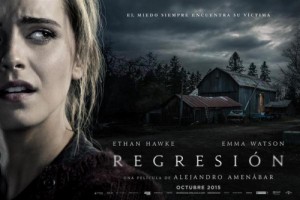Regression

It’s been nearly 15 years since writer/director Alejandro Amenábar presented himself to Hollywood with The Others, a box office smash that single-handedly revived haunted house horror for the new millennium. With Regression, the Spaniard seeks to do the same for the psychological crime thriller – a genre in which, arguably, no film has bested David Fincher’s Seven since its release in 1995.
Supposedly “inspired by” real events, but set in the fictional rural American town of Hoyer, the action in Regression kicks off with 17-year-old Angela Gray (Emma Watson) seeking sanctuary at her local church, claiming to have been sexually abused by her father (David Dencik). Neither victim nor accused have firm memories of the alleged crimes, so an expert in the field of “recovered memory therapy” (David Thewlis) is brought in to assist hardboiled cop Bruce Kenner (Ethan Hawke) investigate. The unlikely pair are soon embroiled in a puzzle involving Satanist ceremonies and police conspiracy, in a patchy mystery yarn which unfortunately fails to find second gear after the promisingly pacey opening 20 minutes.
On paper, the film offers Watson the opportunity for a full-fledged breakout into mature roles, but the single-note nature of the permanently weeping victim, though justified by the plot, gives her little room to display much range beyond a passable American accent. Ethan Hawke does well with what he’s given, but in spite of a reversal of the age-old “test of faith” trope that sees him instead questioning his fervent agnosticism, there’s not sufficient depth to elevate his brooding detective beyond a cut-and-paste stereotype. Thewlis too gives a good performance as the sneeringly stubborn British shrink, but the writing lacks the humour or antagonism to make their pairing worthy of building a film around it.
Ultimately, Amenabár’s main failing here is indecision. He seems unable to fully to commit to either harrowing his audience with an honest exploration of the psychology of abuse, or to making them jump via cliché “face-at-the-window” horror shocks. Torn between these two genres, his tale is too hokey and lacking in focus to commit to either. Telegraphed long before it arrives, the finale’s twist represents the ultimate act of self-sabotage, ensuring that any meagre impact this meandering misfire may have had upon audiences will have faded before they reach the cinema door.
Stuart Boyland
Regression is released nationwide on 9th October 2015.
Watch the trailer for Regression here:


















Facebook
Twitter
Instagram
YouTube
RSS